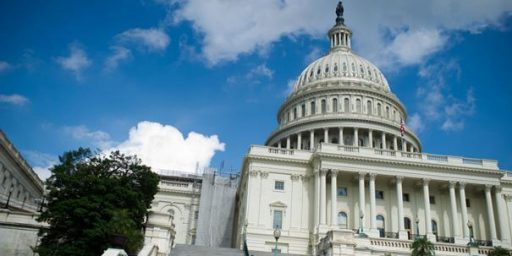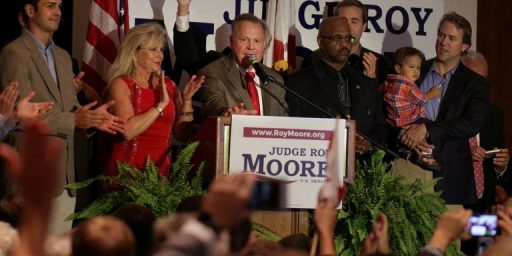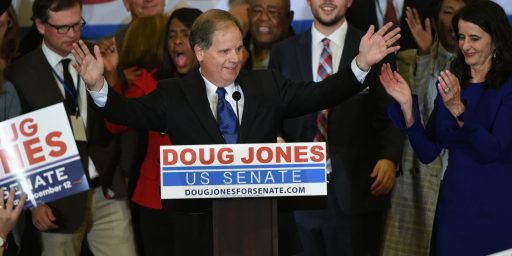Alabama Legislature Moves to Eliminate Special Elections for Senate Vacancies
This is not unreasonable.
Via the Montgomery Advertiser: Alabama House votes to end special U.S. Senate elections.
The Alabama House of Representatives Tuesday evening approved a bill that would end special elections for the state’s two U.S. Senate seats when vacancies occur.
The bill, sponsored by Rep. Steve Clouse, R-Ozark, and coming after last year’s special election for U.S. Senate, would allow a governor’s appointee for a Senate vacancy to serve until the next general election in the state, rather than have the governor call a special election. The appointee would go through regularly scheduled primaries for that contest.
It passed 67 to 31 on a largely party-line vote after a two-hour filibuster from Democrats who said it would diminish voters’ voices in the process.
“You’re taking away from citizens the right to vote,” said Rep. Louise Alexander, D-Bessemer.
Now, do I find the timing suspicious insofar as the most recent special election resulted in the election of a Democrat in a heavily Republican state? I have to admit: yes.
However, do I think this bill is a bad idea? Not at all.
First, special elections do cost money, so that cost-savings is not a fake issue (although given their rarity this not necessarily a slam-dunk argument in and of itself).
Second, and more importantly, it is simply not unreasonable for a vacancy to have an appointee who serves until the next general election. Indeed, most states (36) do it this way.
Let’s consider: under normal circumstances in Alabama the Republican Governor would appoint a Republican replacement for a Republican Senator who had vacated the office. That appointee would, if a special primary and election were held, almost certainly win nomination and then election and go on to be re-elected when the next general election rolled around. This is a pretty standard pattern, nationally.
However, 2017 was not a year marked by normal circumstances. The basic scenario: Senator Session’s replacement, Luther Strange, was appointed by a governor, Robert Bentley, who had to resign not long after he made the appointment due to allegations of an affair with a staffer. The appointment was tainted because many thought a quid pro quo had been offered so that then-state Attorney General Luther Strange would refrain from investigating Governor Bentley in exchange for the Senate seat (and, if anything, he couldn’t investigate once he was a Senator). Further, Bentley stated there would be no special election, but that Strange would serve until the general election in 2018. Bentley, however, had to resign. The new governor, Kay Ivey, said there would be a special election. Strange, tainted by the Bentley appointment, lost a contested primary to, of all people, Roy Moore. Moore was already controversial, even in Alabama, but would probably still have been elected had allegations about his proclivities to prefer teenagers when he was in his thirties not come to light.
In other words: Doug Jones is only Senator due to a preponderance of highly unusual, highly improbable, factors.
And, in truth, the Jones election is an anomaly from a partisan point-of-view: the state is heavily Republican and under almost any reasonable scenario (reality, in this case, was just plain nuts) the state is going to elect a Republican. As such, while part of the inspiration for the bill in question is probably the fact that the state elected a Democrat, the reality is that the bill is not taking away choice, it is just determining when the choice happens.







Another effort by Republicans to repeal that pesky 17th Amendment that takes power away from those who deserve it: Wretched old white men.
When I heard about this last night, my first thought was that it’s the sort of decision that could easily come back to haunt Republicans.
In politics, whenever a party makes institutional changes in reaction to a political disaster they experienced, it often ends up blowing back in their faces later. (You can see that clearly if you look at the history of presidential primaries, for example. The 1972 reforms by Democrats were put in place in reaction to the disastrous 1968 convention, but those very rules led to the nomination of George McGovern. Similarly, after 2012 the GOP tweaked the primary rules to make it easier for a consensus candidate to wrap up the nomination quickly, but that ended up helping Trump.) For instance, what if Alabama elects a Democratic governor? Then a Democratic Senator would become likelier by this recent decision.
“”The people have spoken, the bastards.” — Dick Tuck.
I am somewhat unclear on what the proposed law would do.
Would it mean that the Senator appointed by a Governor would stand at the next regularly scheduled General Election, or at that he or she would serve until the term of the person he is replacing is set to expire?
Also, what happens if a Senator resigns, is forced from office, or dies within 2-3 months of the next General Election or even closer than that?
Talk about sore losers.
BTW, one can argue Donald Shithole Trump is president (or plays one on TV) because George H. W. Bush was too popular in early 1991 and the Democrats didn’t see a mild recession coming.
Kylopod + 1
@Kylopod :
For them, it’s probably as inconceivable an outcome as a Republican being elected Governor of NY so they feel comfortable taking that risk.. They shouldn’t. NY is blue blue blue because NYC is blue – the vast majority of counties turn red at election time, the other cities would keep the state blue but it would be a much, much closer race. Without NYC and it’s million plus Dem votes, the right Republican candidate would have a decent shot at turning NY like Reagan did. These things can and do happen, especially to a state with a medium population state like AL where a demographic shift can hit harder then expected.
All in all – it’s an union between a population and popularity game. Play the wrong candidate and watch your “safe” population shift. It’s a major reason why conservatives are pushing so hard to end “chain migration”. They see it as a future blue wave that will turn places like AL purple or worse. Changing the special election process won’t stop that but hey, feel free to close the barn door after the horse has won the Kentucky Derby.
@KM: FWIW, I think that merit based immigration may backfire on the racist Republicans. If you are going to grade purely on merit, giving preference to say, electrical engineers, or PhD’s, well, who is more likely to want to come to the US? An electrical engineer from Sweden or one from Haiti? A college professor from Cambridge or one from Kumasi Polytech?
@MarkedMan :
Not only is merit-based immigration going to fall flat, adding in the urge to kill “chain migration” will elimination anyone they consider “of value” from ever trying to became a citizen. Why in the world would you give up a nice country to come live in the US all by your lonesome? Should Repubs get their way, we’re asking people with desirable skills from desirable locations to break up their families with no chance to have them come here legally. Most other countries don’t adhere to the nuclear family ideal Americans do and maintain close familial ties as a matter of pride. Hell, the extreme version would have it that you can’t bring over your spouse and children – they’d need to qualify on their own! If the whole point is to make a better life for oneself and one’s family, why are we take family out of the equation?
You’re right – Trump’s making immigration to America unappetizing to the kind of people they claim to want. A bad deal all around if you have other choices and most of the First World immigrants he wants do!
@Kylopod:
“For instance, what if Alabama elects a Democratic governor? Then a Democratic Senator would become likelier by this recent decision.”
No, what would happen is that the Republican legislature and the outgoing Republican governor change that law (and a slew of other laws which allow the governor to do things without the legislature’s consent) during a lame duck session. See what happened in North Carolina following the election of a Democratic governor in 2016.
@KM: Agree, completely. And on top of that, my understanding is that so called chain migration (the term racists use to describe “family migration” as it has been called for decades) was originally imposed by the racists of that era. It was meant to encourage the predominantly white population of 1st, 2nd, 3rd generation immigrants to bring over their relatives.
The best laid plans…
(In support of my above message)
Here’s a quote from a recent WP article:
So called “conservatives” always reveal their true colors. They claim they are pro-family. They claim to believe the (very real) statistics that show that strong family ties reduces crime, drives up education levels, and increases overall family income. They claim to be promoting these conservative values while liberals are trying to destroy the family. But when push comes to shove, that’s just words coming out of their mouths. In this push, they throw all that out the window in pursuit of their real values: racism against the browns.
I wish Democrats had 7% the backbone and spine that Republicans have when it comes to exercising power.
Republicans don’t bother with nuance:
Hold open Supreme Court vacancy for over 1 year to game election results? [check]
Extreme obvious-even-to-guys-like-Louie-Gohmert gerrymandering? [check]
Plans to use Federal Census to shift more power to low population rural areas? [check]
@KM:
I don’t have the hard data in front of me, but my sense is that within any state, minority-party governors are elected a lot more often than minority-party Senators. It’s easy to imagine Republicans in a red state facing a situation comparable to what Dems potentially faced in NJ last fall with Sen. Bob Menendez’s corruption trial and the probability that lame-duck Gov. Chris Christie would appoint a Republican replacement if Menendez resigned. (That scenario has been taken off the table since Christie retired, but on another note I think Dems are nuts to consider nominating Menendez again.)
I suppose my fundamental point is this: this really doesn’t matter. It doesn’t matter as a practical matter, given the extreme rarity of Senate vacancies. Moreover, and more importantly (to me), I do not think it matters in terms of democratic outcomes/quality.
So, while I agree that the move is motivated by sore-loserism, I just don’t think it is worth getting upset over–especially when there are far more important issues worthy of energy.